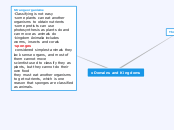by Nour El Huda 9 years ago
528
Domains and kingdoms
This is a sample mind map

by Nour El Huda 9 years ago
528

More like this
-Have nucleus -Membrane-bound organelles
Kingdom Animalia
animals depends on the organisms from other kingdoms
Depends on Bacteria & Fungi
To recycle the nutrients found in dead organisms
depends on Plants
For food
have specialized sense organs
Help most animals to respond quickly to their environment
usually able to move around
contains Complex. multicellular organisms
Dont have cell walls
Kingdom Plantae
plants provide habitat for other organisms
Most life on earth is dependent on plants
Fungi. Protists, Bacteria consume plants
they digest the plant material and get energy and nutrients made by plants
Food that plants make is important for all organisms that get nutrients from plants
they must expose to sunlight for photosynthesis
have cell walls make food through photosynthesis
Kingdom Fungi
Use digestive juices to break down substances
Absorb nutrients from substances in their surroundings.
Complex mulicellular
unlike animals
They don't eat food
Unlike plants
they don't perform Photosynthesis
Kingdom Protista
single-celled or simple multi-cellular organisms
Protists also include slime molds and euglenoids.
Plant-like called Algae
Animal-like called Protozoans
harmful
Pneumonia: Lung infection
Useful
Escherichia coli produce vitamin K in human intestines
Subtopic
single celled that dont have nucleus